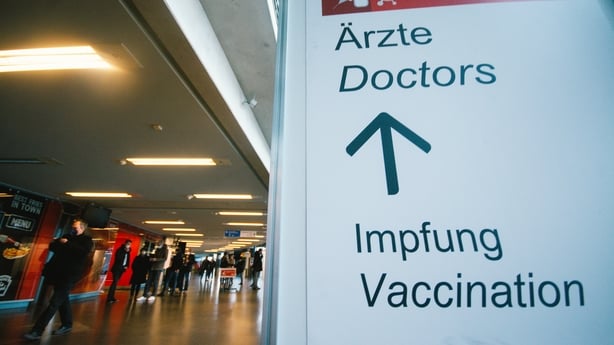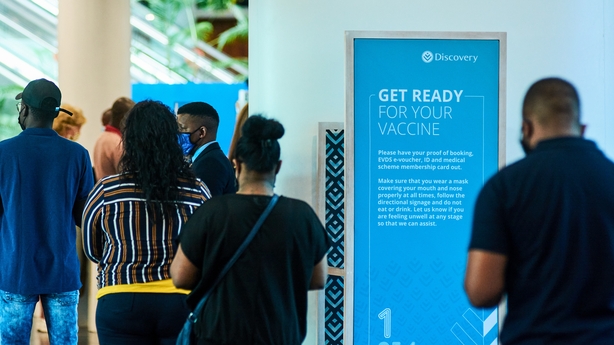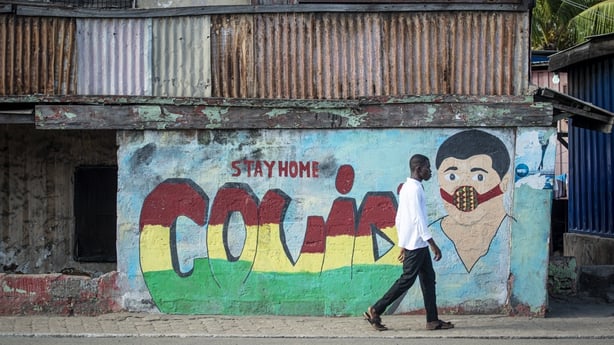Hong Kong will require inbound travellers from the United States to spend seven days at a government quarantine camp, after a passenger coming from the US tested positive for the Omicron variant of Covid-19.
The new rules, which come into effect on Monday, means travellers from the US will be subject to the highest tier of quarantine measures in the semi-autonomous city, which has some of the strictest anti-Covid policies in the world.
They will make the US the first country outside of Africa to be placed under a quarantine centre order since the Omicron variant was first detected last month.
Travellers from the US will only be allowed to enter the city if they are fully vaccinated Hong Kong residents and will be required to spend their first seven days at a quarantine centre with daily testing and health monitoring.
Afterwards, they will need to spend another 14 days in quarantine at a hotel booked in advance.
US travellers entering Hong Kong are already required to quarantine for a total of 21 days, but under current rules, they can remain in a hotel for the duration of their isolation.
The Hong Kong government said it was tightening its rules after confirming a new Omicron case - the city's fifth - involving a 37-year-old man arriving from the United States.
"The whole genome sequencing conducted by the Department of Health's Public Health Laboratory Services Branch confirmed the case to be an Omicron case," it said.
Hong Kong has followed China's lead in adopting a "zero-Covid" strategy, which has led to some of the toughest quarantine and testing measures in the world.
The policy has kept infections low but ensured a business hub that dubs itself "Asia's World City" has been cut off internationally for the past 21 months.
German MPs pass vaccine requirement for health workers
Germany's lower house of parliament has passed a draft law requiring healthcare workers and soldiers to be inoculated against Covid-19, a first step toward possible mandatory jabs for all adults.
A large majority of Bundestag MPs voted for the measure requiring staff at hospitals, doctors' offices and care homes to be fully vaccinated by mid-March 2022.
The Bundesrat or upper house is expected to pass the bill later today following similar moves by France, Italy, Britain and Greece.
Health Minister Karl Lauterbach, who took office this week with the new government under Chancellor Olaf Scholz, asked deputies from across the political spectrum to support the measure to protect vulnerable groups.
"The pandemic is a mission for us all, this isn't a moment for party politics," he told the chamber before the vote.
He said he hoped Germany could break a vicious fourth wave of the outbreak by the end of the month so that people could visit their families over the holidays.

"That's what we're fighting for," he said, stressing the need to slow the spread of the Delta virus variant and stop the Omicron strain from gaining ground.
Mr Scholz, who took power on Wednesday, has come out strongly in favour of mandatory vaccinations after the voluntary campaign fell short with just under 70 percent of the population fully inoculated.
Around 21% have received a booster shot.
Expanding the mandate to the general public would see the country follow the example of neighbouring Austria, which is requiring vaccinations from February.
South Africa says no signal of increased Omicron severity yet
South African scientists have said they see no sign that the Omicron coronavirus variant is causing more severe illness, as officials announced plans to roll out vaccine boosters with daily infections approaching an all-time high.
South Africa alerted the world to Omicron late last month, prompting alarm that the highly mutated variant could trigger anew surge in global infections.
Hospital data show that Covid-19 admissions are now rising sharply in more than half of the country's nine provinces, but deaths are not rising as dramatically and indicators such as the median length of hospital stay are reassuring.

Although scientists say more time is needed to arrive at a definitive conclusion, Health Minister Joe Phaahla said the signs on severity were positive.
"Preliminary data does suggest that while there is increasing rate of hospitalisation ... it looks like it is purely because of the numbers rather than as a result of any severity of the variant itself, this Omicron," he said.
South Africa reported more than 22,000 new Covid-19 cases yesterday, a record during the current fourth wave of infections driven by Omicron but still below a peak of more than 26,000 daily cases during a third wave fuelled by the Delta variant.
It has fully vaccinated about 38% of adults, more than in many other African countries but well short of the government's year-end target. It recently delayed some vaccine deliveries due to oversupply as the pace of inoculations slowed.
A small study from a South African research institute this week suggested that Omicron could partially evade protection from two doses of the Pfizer vaccine, but the company and its partner, BioNTech, say a three-shot course of their vaccine can neutralise Omicron in the laboratory.
Glenda Gray, president of the South African Medical Research Council, said there were far more unvaccinated people among South Africa's hospital admissions and the evidence was that the Pfizer vaccine was still offering protection.
"We are seeing that this vaccine is maintaining effectiveness. It may be slightly reduced, but we are seeing effectiveness being maintained for hospital admissions and that is very encouraging," she said.
Czechs make Covid vaccine mandatory for over-60s from March
The Czech Republic has made Covid-19 vaccines mandatory for people aged 60 and above from 1 March, the government said on Friday, as it battles one of the highest infection rates in the world.
The obligation will also apply to health workers, police officers, firefighters and the military.
"We see that people of a certain age are those most likely to be hospitalised in intensive care," Health Minister Adam Vojtech said.
The new regulation has been approved just a week before a new Czech government is set to take over.
The new health minister nominee has already said he is opposed to mandatory vaccinations for seniors and wants to modify the legislation.
The Czech Republic has reported 981 Covid cases per 100,000 people over the past seven days - the second-highest infection rate after its neighbour Slovakia.
Ghana requires proof of vaccination for travellers
Public health authorities in Ghana have introduced new travel guidelines requiring visitors to show proof of vaccination against Covid-19 from next week as the government tries to avert a fourth wave of infections.
Under new rules coming into effect from midnight on Sunday, travellers "will be required to provide evidence of full vaccination," Ghana's director-general of health services, Patrick Kuma-Aboagye, said.
"All Ghanaians travelling out of the country are to be fully vaccinated," he added in a statement.
The west African nation has administered just over 5.7 million doses and virus cases are low.
Unvaccinated Ghanaians and residents currently outside the country who intend to return within 14 days of the deadline will still be allowed in.

"However, they would be vaccinated on arrival at the airport," said Mr Kuma-Aboagye.
Other travel requirements such as a negative PCR test prior to travel and an antigen test on arrival to Ghana remain in place.
The country has recorded just over 131,000 cases and 1,200 deaths since the start of the pandemic.
Ghana along with neighbouring Nigeria said last week it had detected cases of the new Covid-19 variant, Omicron.
Several countries in Europe and Asia have imposed vaccine passports for travel or to access certain public spaces.
England announced this week it will require proof of vaccination to enter nightclubs and other large entertainment venues.

